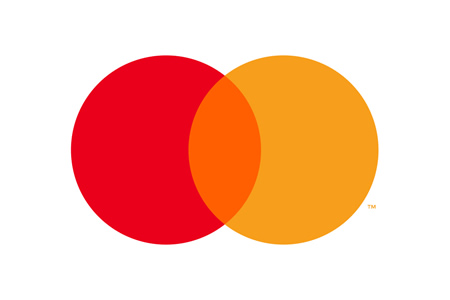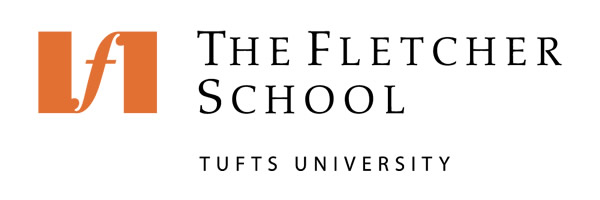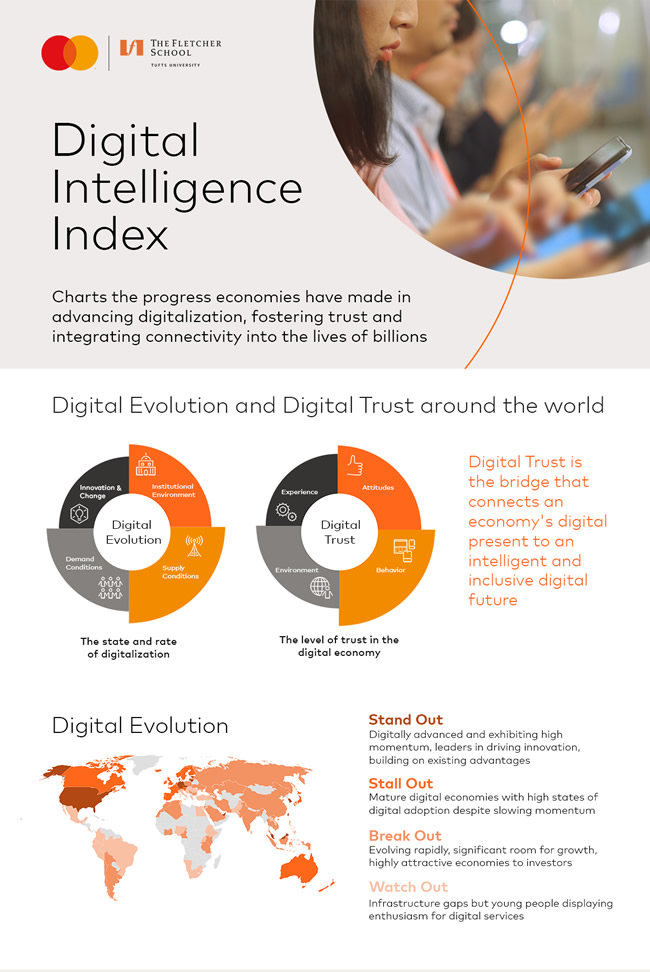« Nissan to launch the all-new Nissan Magnite in India. | Main | The USA Wins First-Ever Miss Earth Crown »
December 1, 2020
New Global Index Defines What Makes Digital Economies More Trusted and Resilient
• Digital Intelligence Index from The Fletcher School at Tufts University and Mastercard provides an in-depth look at the rate of technology adoption and the state of digital trust around the world.


Purchase, NY & Medford, MA. December 01, 2020 — The Fletcher School at Tufts University, in partnership with Mastercard, unveiled the Digital Intelligence Index. It charts the progress countries have made in advancing their digital economies, fostering trust, and integrating connectivity into the lives of billions.
This year’s index paints a picture of global digital development, sheds insight on key factors driving change and momentum, and unpacks what this means for economies facing the challenges of a worldwide pandemic and post-pandemic future.
Notably, the most dynamic digital economies - such as the United States, South Korea, Taiwan, UAE, and Germany - significantly outperformed the OECD (Organisation for Economic Co-operation and Development) growth rate in Q2 2020 amidst the global lockdown. They feature high levels of available talent, active R&D collaboration between industry and academia, and a strong record of creating and bringing digital products into the mainstream.
Bhaskar Chakravorti, Dean of Global Business at The Fletcher School, said, “The pandemic may be the purest test of the world’s progress towards digitalization. We have a clearer view of how dynamic digital economies can contribute to economic resiliency during a time of unparalleled global turmoil and can recover and change.”
Other key findings include:
With nearly two-thirds of the world’s population online today, we are entering an ‘after access’ phase, where access alone is not enough. Aspects such as the quality of access, effective use of digital technologies, accountable institutions, robust data governance policies, and fostering trust are more excellent factors in determining digital competitiveness and sustainability.
Ajay Bhalla, president, Cyber & Intelligence, Mastercard, said, “Never before has there been such an acute need to understand the factors that drive digitalization and digital trust. With that knowledge, businesses and governments can work together to help all 7.6 billion people worldwide benefit from the vast opportunities a digitally advanced economy can bring. While much remains uncertain today, it is clear that digital success will be a key building block in our collective recovery.”
A Global Outlook on Digital Evolution and Trust
This year’s index looks at two components: Digital Evolution and Digital Trust. Digital Evolution captures an economy’s historical momentum from the physical past to the digital present. Digital Trust is the bridge that connects its journey from the digital present to an intelligent and inclusive digital future.

Mapping 95% of the world’s online population and drawing on 12 years of data, the Digital Evolution scorecard measures 160 indicators in 90 economies across four key pillars: institutional environment, demand conditions, supply conditions, and the capacity for innovation and change. These segment into four categories:
Stand Out economies - Singapore, United States, Hong Kong, South Korea, Taiwan, Germany, Estonia, UAE, Israel, Czech Republic, Malaysia, Lithuania, and Qatar - are highly digitally advanced and exhibit high momentum. They are leaders in driving innovation, building on their existing advantages in efficient and effective ways.
Stall Out economies - such as Sweden, United Kingdom, Netherlands, Japan, and Canada - are mature digital economies with a high digital adoption state despite slowing digital momentum. They tend to trade off sustainability speed.
Break Out economies - such as China, India, Indonesia, Poland, and Russia - are evolving rapidly. With such momentum and significant headroom for growth, they are often attractive to investors.
Watch Out economies - such as Nigeria, Uganda, Colombia, Peru, Pakistan, and Sri Lanka - have several infrastructure gaps. Despite this, young people show enthusiasm for a digital future with increased social media and mobile payments.
The Digital Trust scorecard measures 198 indicators in 42 of the index’s economies across four key pillars: behavior, attitudes, environment, and experience.
Economies such as Brazil, Colombia, and Mexico are beginning to build momentum on behavior scores, demonstrating substantial engagement on social media and other new technologies.
Economies such as China, Indonesia, and Vietnam have increasingly favorable attitudes about their digital future, buoyed by rapidly expanding digital adoption and opportunity.
Economies with more mature digitalization approaches such as Sweden, the Netherlands, and Denmark share measures that strengthen the trust environment, such as privacy, security, and accountability policies. Citizens in these countries tend to have more optimistic attitudes towards the future of digitalization.
Economies such as the United States, Hong Kong, Taiwan, South Korea, and Singapore provide citizens with a near-seamless experience, delivering the holy grail of advanced infrastructure, broad access, and unparalleled interaction. This experience is matched by high engagement levels, offering these economies a clear advantage in a ‘beyond access’ future.
Source: Mastercard
|GlobalGiants.Com|







Edited & Posted by the Editor | 11:48 AM | Link to this Post







